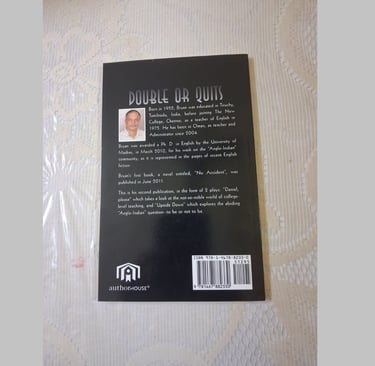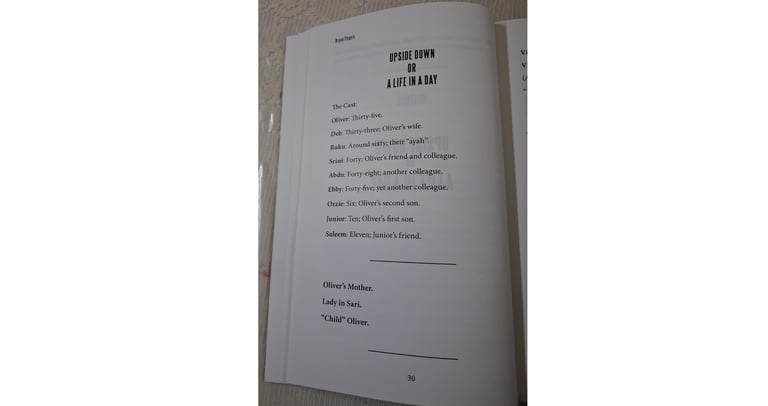My Second Foray
The next Book of mine
12/4/20243 min read
My second published work followed the first almost immediately. This was Double or Quits, an even slimmer volume than the previous one. The book contains two plays: Daniel, please or “A Day in the life” and Upside Down, sub-titled “A Life in a day”. This book, like the first, came out in 2011 and again met with limited success. The two plays are related to each other, not because of the subject matter, but because the protagonist in both bears the same name. As may be ascertained by their sub-titles, the plays are topical, but quite distinct, for they explore different themes differently.


Daniel, please takes its title from the Biblical Daniel, known for his sound judgement. It is a play in five scenes, corresponding to the ringing of the College bell, to indicate that one session is over and the next is about to commence. The play focusses on the small English Department in one of the City Colleges. There are only six faculty members, but the fault lines are clearly visible. Two “players” belong to a minority Christian denomination in this Christian minority College and therein lies the root cause of all the hullaballoo. As you can imagine, there is hardly anything intellectual about the proceedings, for most of the players have lost hope and are just going through the motions. Towards the end of the play, one more “character”, the attender or peon, provides comic relief to the tragedy that has just unfolded. Will a Daniel really come to judgement? Your guess is as good as mine, dear Reader.


If I have painted a sordid picture of the day-to-day life in a college campus, it is because the truth is a painful reality. The famous Indian writer, Nirad C Chaudhuri, was of the opinion that at least 90 percent of all college-level teachers in India were misfits. He wanted the crème-de-la-crème—the successful IAS/IPS/IFS candidates—to don the mantle of guiding India’s future citizens. Did anyone pay heed?
Another insidious emotion, that often lies dormant, but can ignite fierce passion, is what is known as “professional jealousy”. This sentiment is very real and I have experienced the same in my teaching career, especially in foreign climes. How could I, a mere Indian, be the Head of an English Language Centre? Did I think I was better than native speakers of English? Was I even capable of steering the ship? Of course, I answered all these doubts and more, because, I know for a fact, the jealousy comes only from nagging doubt, from insufficient knowledge and from making value judgements using superficial techniques. Also, the one spouting these jaundiced views has very low self-esteem, because he/she cannot stomach the truth that there is talent out there. Undoubtedly, the Iago’s with their “motiveless malignity” will always be around, but these types can never hope to hide in the shadows forever.


The second play, Upside Down, or “A Life in a day”, is about “going away”. It is relevant because even today a great number of Anglo-Indians believe that the grass is greener on the other side. The protagonist, Oliver, and his family are about to relocate to Australia. One last drinking party involving some of his colleagues shows that there is still a lot of rancor in Oliver’s mind, but he just about manages to stay in control. When the group assembles at the dining table, the conversation reveals the continuing turmoil that hounds Oliver. A final cup of tea and it is time for farewells. They decide on a “date” when Oliver returns to India on a visit.
Many years later, when Oliver finally returns, he finds things quite changed, perhaps even upside down! Nothing can be done, however; the world has moved on. The “date” is kept, but Oliver cannot fully participate in the banter between his friends. The play ends on a note of enduring despair, for a whole lot of mixed emotions now engulf a distraught Oliver.
I believe a writer should interest himself in one thing and one thing only: the truth; in fact, his truth. The rest of the world may not corroborate his world-view, but if the same is sufficient for the writer, that is more than enough compensation. The old saying: “the truth shall set you free” still holds good, even in this day and age. I, too, may have irked not a few people with my writing; I know I have written my truth and that will always be good enough for me.
